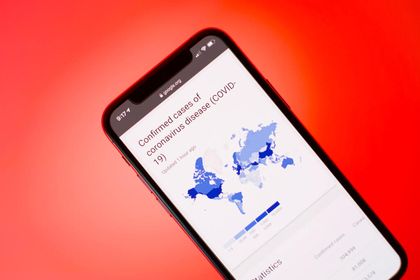Let us listen carefully, think deeply, change appropriately to the messages from the media and speak relevantly through the media into our society.
 Photo: Alex Bracken. Unsplash (CC0).
Photo: Alex Bracken. Unsplash (CC0).
People in many countries are staying in social isolation in order to slow down the spread of the novel coronavirus COVID-19.
Many now want current information about how to respond to, and learn about, the unfolding pandemic in the various contexts. Many people are also contributing to media channels by either forwarding messages or crafting their own.
I have begun to feel both overwhelmed by the countless messages bombarding me, and confused about what I could contribute as valuable messages to others. Amidst this fast-changing use of the media, how can we engage with the media in a meaningful way?
We at the Lausanne Media Engagement Network wish to provide you with practical help so that you can connect intentionally with the media.
To engage or to not engage with the media?
During these times of “social distancing” we can easily disconnect from people around us. The first question we as followers of Jesus want to address is our motivation for communication: Why would we want to communicate with others?
In a period where people are losing hope, we can speak with certainty of our hope. The Psalmist King David inspires us to cling to hope:
“Wait with hope. Hope now; hope always!” Psalm 131:3b (The Message)
We want to yearn for this hope. We want to be living within such a hope. Yet this is not just a hope in anything; this is hope in God for salvation:
“I wait in hope for your salvation, God.” Genesis 49:18 (The Message)
During times when hope is needed, we need to be cautious to not disengage from others. Rather, we want to interact intentionally with others in order to share this hope with them. Jesus spurs his disciples on to be salt and light in this world:
“Let me tell you why you are here. You’re here to be salt-seasoning that brings out the God-flavours of this earth.” Matthew 5:13 (The Message)
We have a purpose for interacting with people. While we self-isolate during the pandemic, such interaction can primarily occur in various ways through the media.
 Photo: Brian Mcgowan. Unsplash (CC0).
Photo: Brian Mcgowan. Unsplash (CC0).Listen, think, change, and then speak while engaging with the media
With access to social media channels at our fingertips, we can so easily contribute our thoughts to the media. Even the traditional media channels are regularly asking for our response.
We can easily comment spontaneously on these messages. Yet we would be wise to begin by listening carefully. Then we can think carefully about what we have heard.
Next, we let those ideas we have reflected on change what we actually do. Only then, long after we have begun listening, do we begin to speak out our own thoughts into the media.
1. “Listen” to the media
You begin listening amidst the many messages that are sent back and forth about the coronavirus. As you absorb the messages you can ask, “What are people really saying or communicating?”
Continue to pay close attention with your ears and with your eyes, and with your whole being. Consider even listening carefully with your emotions by asking, “How do people feel about what they are communicating?”
Be attentive to the various types of media: Go beyond your usual media channels. Look for media from other sectors or from other countries than where you usually find your information.
In our times of electronic media, consider buying a physical newspaper to move beyond your usual algorithmic bubble of information. Read sections that are unfamiliar to you, such as the pages for economics, international affairs, finance, or entertainment.
Be cautious of your media choices: As you consume media to learn about the world around you, be careful which media content you consume and how you use the media tools (Telfer 2015, p. 8).
Even media that you consider being “only entertainment” communicate powerful messages. As you listen to perspectives from various media channels, consider that every media package brings you messages with a deeper meaning.
Listening is much more than only gathering information. You want to ask appropriate questions before you then find suitable answers. “By getting better at questioning, you raise your chances of unlocking better answers” (Gregersen 2018, p. 17).
Through your listening, explore more than simply learning what the message is about. Dig deeper into what meaning is being communicated to answer the questions that you are asking.
As you listen to the various contrasting messages about the coronavirus, you also need to be thinking about the media.
2. “Think” about the media messages
Thinking deeply about the media has become increasingly difficult in recent years with such a flood of media snippets crying for our attention. The very way we read, write, and even think has been changing (Carr 2011, p.200). So how do you focus on thinking about what you learn from the media?
As you receive more and more information through the media, you naturally “categorise” this information into different generalised “groups”. You do this to fit the new information within the existing framework of knowledge in your mind.
When you “think” about the new information, question yourself about how you categorise the new information in order to avoid generalising incorrectly. You can actively ask yourself how you place pieces of information into specific “groups”.
Ask how your new information might differ from the existing information that may initially look similar. Even when you think the new information is quite different from existing information in other categories, consider what might be similar.
Beware of exceptional examples of information that are communicated in the news, because even though you may remember these stories vividly, they may be just that – the exception.
Even when you receive information that seems strange to you, humbly explore further in order to understand the deeper issues around this new information.
Such strange information may be not accurate, but it just might be valuable new information you are discovering that you have not yet thought about (Adapted from Rosling, Rosling, and Rönnlund 2018, p. 165).
You may want to keep these questions at hand as you think about the media messages:
- What information affirms my perspectives or what agrees with my past experiences?
- What information is new, different or unexpected to me?
- What is my own perspective on the issue in the light of these media messages?
- From what I learn, how may I need to think differently about specific topics?
- Which of the new ideas that I hear are critically important?
- How does this new information relate to people in my wider society?
- How do I personally feel about this information I have obtained? Does this media message make me feel anxious and fearful or calm and encouraged?
As you think intentionally about the media messages flying all around you about social distancing, health guidelines, and the economic impact of the virus, you gain a clearer perspective on how the meaning of these messages affects you.
 Photo: Hello Im Nik. Unsplash (CC0).
Photo: Hello Im Nik. Unsplash (CC0).3. “Change” in response to messages
When messages influence your life, you can act differently. This is the process of “transforming” due to the media that you consume. You may already be doing this subconsciously as a result of the many newscasts you have received, the movies you have watched, and the social media posts you have scrolled through.
When the way you see the world changes, you begin responding differently to what is happening around you. By becoming more conscious of the meaning of the media messages you consume, you can be more intentional about the types of changes you make in your life.
Ask yourself these questions:
- How does the information I receive through the media already affect what I do?
- What new information have I obtained that is changing how I see the world?
- Which information would I rather not respond to so that I can keep my current habits?
- How would I need to live differently in response to the valuable new insight I have gained? What specifically would I do differently in my daily life?
- Would I need to act differently only once, twice, multiple times, or would I need to develop new habits that last a lifetime?
- How would the message I obtain through the media affect my personal values, my life principles, or even my own worldview?
Some of these questions about the value of the media messages may be easy to answer. Yet sometimes the information we gain, together with our life experiences, causes us to explore deep changes in our lives.
You may hear media messages about the coronavirus that focus you to change how you act in your daily life so that you do something to keep healthy.
You can easily change your daily practices by washing your hands regularly, yet seeing the deep-seated needs of this world, such as abject poverty and extreme hunger, in a different light is much more difficult.
At the point where we begin to act personally on the information, we become able to speak into the lives of others through the media.
4. “Speak” relevantly into the media
When the messages you have received have changed your life, then you gain the permission to speak relevant messages to others. Acting on what you learn makes your own message credible, as the apostle James wrote:
“Dear friends, do you think you’ll get anywhere in this if you learn all the right words but never do anything? Does merely talking about faith indicate that a person really has it?” James 2:14 (The Message)
Consider how the words of God affected the prophet Ezekiel: first he had to listen, then think about the message, then change himself, and finally he was sent to speak to the people around him:
Then he said, “Son of man, get all these words that I’m giving you inside you. Listen to them obediently. Make them your own. And now go. Go to the exiles, your people, and speak. Tell them, ‘This is the Message of God, the Master.’ Speak your piece, whether they listen or not.” Ezekiel 3:10 (The Message) [Emphasis added.]
Be careful to listen to God speaking to you personally. God’s voice can reach you both through His Word and through the messages you hear via the media from the world around you.
Internalise these words in order to really make them your own. Live within these words of God and then carefully communicate these words through the media to the people around you.
Think of these questions:
- What is the centre of the message that God is planting in my heart?
- How does all this information (what I learn from the media, what I think about, and how I change) actually affect other people?
- Of what value are these insights to them?
- How can this message help people be inspired, encouraged and motivated?
- In what ways will this information be life-changing or even life-saving?
- Of what value would the message be to the social organisations in my wider community, such as churches or economic initiatives?
With information about the coronavirus being distributed at such a rapid rate, you may want to define carefully what original contribution you can make to the conversations.
As you consider formulating a message that you can speak to others, explore how you can utilise the media to communicate your message well:
- Who can join me in shaping this message?
- What resources and tools do I need for communicating the message well?
- How can I package this message as media content into a suitable media format?
- Which appropriate media platform(s) can I use to distribute this message?
- How can I intentionally use a messaging channel to interact with people about my message?
- How can I continue sharing this message over time on a longer-term basis?
When we as Christians contribute messages to our society, we do more than share about faith and life. Jesus the Saviour transforms not only what we do, but even shapes the type of people we are (Wilkens and Sanford 2009, p. 199).
So every type of communication, by what we say and by who we are, should bring a restoring message to the lives of people. Whatever they read, hear, or view in our message on a media channel will communicate as much about who we are as it does about what we say.
 Gerd Altmann. / Pixabay.
Gerd Altmann. / Pixabay.How do we engage well with the media amidst the coronavirus pandemic?
Let me share with you part of my personal experience. As the first news items reached me about the coronavirus, I observed the growing impact of this disease.
My initial panicked response was, “How can ‘I’ get through this coronavirus crisis alright?” By purchasing additional food. But then I looked for alternative information and found media that inspired me to remain calm by also considering others. So we purchased more food that we could give away to others.
When I read the words of the prophet Isaiah (40:31) that “those who wait upon God get fresh strength”, my orientation slowly changed. My thinking switched towards, “How can we get through this pandemic ‘together’ by inspiring one another to trust God?”
Suddenly this became a message worth sharing. When a man then asked for food for his children, I knew it was the right thing to help, both with food and with an encouraging message for him.
Going through the challenges of life together, whether due to the COVID-19 virus or any other causes, needs to become the “new normal” for us in a post-modern self-centred culture. Such a message is worth living for as well as worth communicating through the media channels.
Together engaging well with the media
- Let us listen carefully as we receive the various media messages.
- Then let us think deeply about the meaning of these messages.
- And let us change appropriately to the messages from the media.
- Finally, let us speak relevantly through the media into our society.
When we have carefully processed by reflecting on messages and modelling our lives on what has been shaped in our hearts, then our own personal message can become most valuable and precious to the people who use the original media we distribute.
Rudolf Kabutz serves with TWR in South Africa as a future media strategist and project coordinator, focusing on using new social media initiatives to supplement broadcasting media for equipping leaders in Africa. Holding master’s degrees in mathematics as well as strategic foresight, he co-leads with Lars Dahle as Lausanne Catalyst for Media Engagement.
This article originally appeared in the Lausanne Media Engagement Network website and is published here with permission.
- Carr, Nicholas G. 2011. The Shallows: What the Internet Is Doing to Our Brains. New York: W.W. Norton & Company.
- Gregersen, Hal B. 2018. Questions Are the Answer: A Breakthrough Approach to Your Most Vexing Problems at Work and in Life. New York: HarperBusiness.
- Rosling, Hans, Ola Rosling, and Anna Rosling Rönnlund. 2018. Factfulness: Ten Reasons We’re Wrong about the World and Why Things Are Better than You Think. London: Sceptre.
- Telfer, Phillip. 2015. Media Choices: Convictions or Compromise? Media Talk 101.
- Wilkens, Steve, and Mark L. Sanford. 2009. Hidden Worldviews: Eight Cultural Stories That Shape Our Lives. Downers Grove, IL: IVP Academic.

Las opiniones vertidas por nuestros colaboradores se realizan a nivel personal, pudiendo coincidir o no con la postura de la dirección de Protestante Digital.
Si quieres comentar o